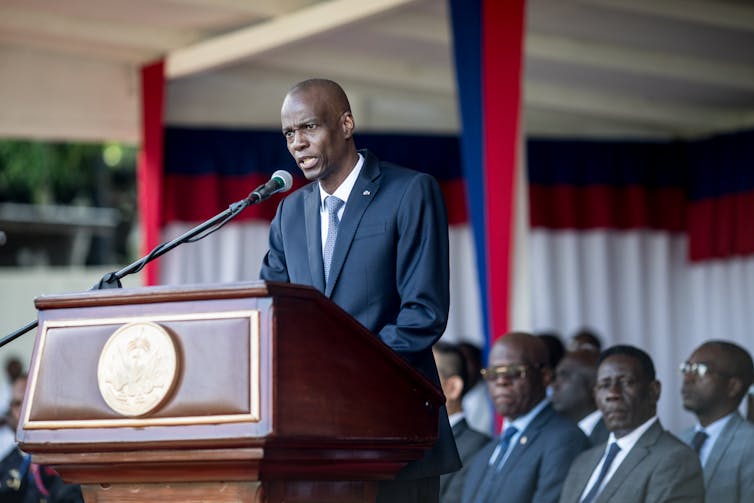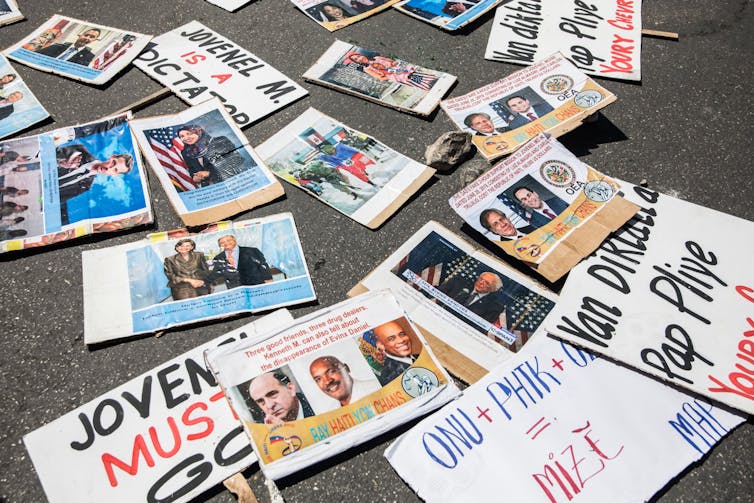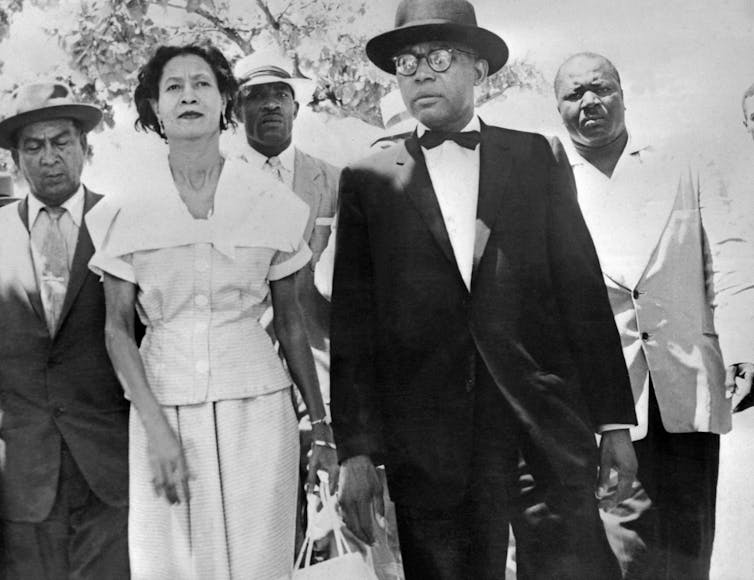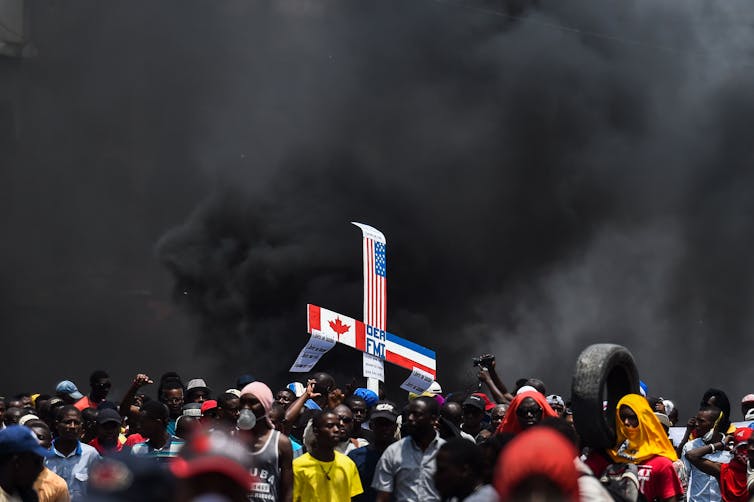SLAIN HAITIAN PRESIDENT FACED CALLS FOR RESIGNATION, SUSTAINED MASS PROTESTS BEFORE KILLING

Haitian President Jovenel Moïse was assassinated in the early morning hours of July 7, 2021, in a brazen attack on his private home outside Port-au-Prince, the capital.
Moïse’s wife was also shot in the assault that killed her husband. The assailants have not been identified, and Haiti’s prime minister reports he is running the country.
Moïse’s assassination ended a four-and-a-half-year presidency that plunged the already troubled nation deeper into crisis.
A political novice
Jovenel Moïse, 53, was born in 1968, meaning that he grew up under the Duvalier dictatorship in Haiti. Like most Haitians today, he lived through turbulent times – not only dictators but also coups and widespread violence, including political assassinations.
Moïse, a businessman turned president, made his way into politics using political connections that stemmed from the business world. Initially he invested in automobile-related businesses, primarily in the north of Haiti, where he was born. Eventually, he ultimately landed in the agricultural sector – a big piece of the economy in Haiti, where many people farm.

In 2014, Moïse’s agricultural finance company Agritrans launched an organic banana plantation, in part with state loans. Its creation displaced hundreds of peasant farmers, who received minimal compensation.
But the business brought Moïse prominence. It was as a famed banana exporter that Moïse met then-Haitian President Michel Martelly in 2014. Though he had no political experience, Moïse became Martelly’s hand-picked successor in Haiti’s next election.
Martelly was deeply unpopular by the end of his term, but party leaders assumed that Moïse would be more welcomed given his relatable background in farming.
A divisive and unstable presidency
Instead, Moïse barely eked out a win in a November 2016 election that fewer than 12% of Haitians voted in. His meager electoral victory came after two years of delayed votes and confirmed electoral fraud by Martelly’s government.
In 2017, Moïse’s first year in office, the Haitian Senate issued a report accusing him of embezzling at least US$700,000 of public money from an infrastructure development fund called PetroCaribe to his banana business.
Protesters flooded into the streets crying “Kot Kòb Petwo Karibe a?” – “where is the PetroCaribe money?”

Lacking the trust of the Haitian people, Moïse relied on hard power to remain in office.
He created a kind of police state in Haiti, reviving the national army two decades after it was disbanded and creating a domestic intelligence agency with surveillance powers.
Since early last year, Moïse had been ruling by decree. He effectively shuttered the Haitian legislature by refusing to hold parliamentary elections scheduled for January 2020 and summarily dismissed all of the country’s elected mayors in July 2020, when their terms expired.
Sustained protests – over gas shortages and blackouts, fiscal austerity that has caused rapid inflation and deteriorating living conditions, and gang attacks that have killed several hundred, among other issues – were a hallmark of Moïse’s tenure.
Existing street protests exploded in early 2021 after Moïse refused to hold a presidential election and step down when his four-year term ended in Feburary. Instead, he claimed his term would end one year later, in February 2022, because Haiti’s 2016 election was postponed.
Before his death, Moïse planned to change the Haitian Constitution to strengthen the powers of the presidency and prolong his administration.
Memories of a dictatorship
For months before his assassination, Haitian protesters had been demanding Moïse’s resignation.
For many Haitians, Moïse’s undemocratic power grabs recall the 30-year, U.S.-backed dictatorships of François Duvalier, known as “Papa Doc,” and his son, Jean-Claude “Baby Doc” Duvalier.

Both Papa Doc and Baby Doc relied on murdering and brutalizing Haitians to remain in power, with the unspoken approval of Western political interests in Haiti. Working with the Duvaliers, U.S. manufacturers in Haiti ensured that their investments were profitable by pushing for wages to remain low and working conditions to remain poor.
When mounting Haitian protests ended the regime in 1986, Baby Doc fled the country. The Duvaliers had enriched themselves, but Haiti was left in economic collapse and social ruin.
The 1987 Haitian Constitution that Moïse sought to change was written soon after to ensure that Haiti would never slide back into dictatorship.
Beyond Moïse’s use of state violence to suppress opposition, anti-Moïse protesters before his killing pointed out another similarity with the Duvalier era: the United States’ support.
In March, the U.S. State Department announced that it supported Moïse’s decision to remain in office until 2022, to give the crisis-stricken country time to “elect their leaders and restore Haiti’s democratic institutions.”
That stance – which echoes that of Western-dominated international organizations that hold substantial sway in Haiti, such as the Organization of American States – sustained what was left of Moïse’s legitimacy to remain president.

Haitians unhappy with continued American support for their embattled president held numerous demonstrations outside the U.S. embassy in Port-au-Prince, while Haitian Americans in the U.S. protested outside the Haitian Embassy in Washington, D.C.
From its invasion and military occupation of Haiti from 1915 to 1934 to its support of the Duvalier regime, the U.S. has played a major role in destabilizing Haiti.
Ever since the devastating Haitian earthquake of 2010, international organizations like the United Nations and nonprofits like the American Red Cross have also had an outsize presence in the country.
Now, the unpopular president that foreign powers supported in hopes of achieving some measure of political stability in Haiti has been killed.
This story is a substantially updated and expanded version of an article, originally published on May 10, 2021.![]()
Tamanisha John, Ph.D. Candidate of International Relations, Florida International University
This article is republished from The Conversation under a Creative Commons license. Read the original article.

